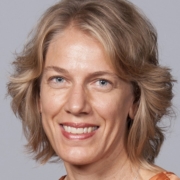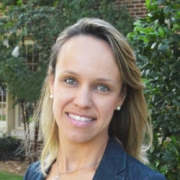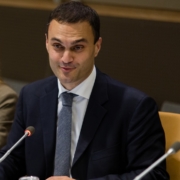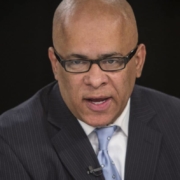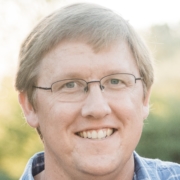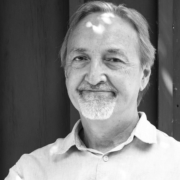A Political Act: Youth Voices and Environmental Education in Brazil
Mari Casellato
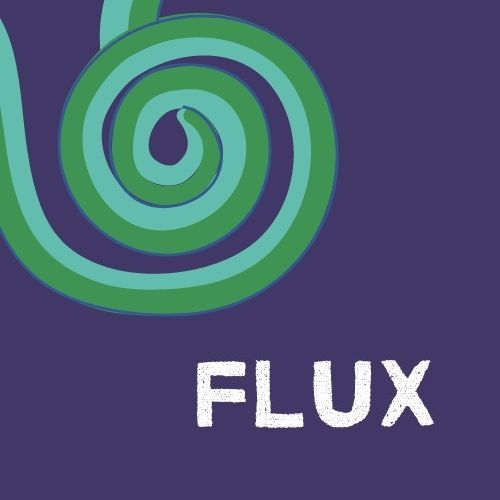 Today we air the third episode of Flux, a FreshEd series where graduate students turn their research interests into narrative-based podcasts. This episode is by Mari Casellato, a recent graduate of Teachers College, Columbia University.
Today we air the third episode of Flux, a FreshEd series where graduate students turn their research interests into narrative-based podcasts. This episode is by Mari Casellato, a recent graduate of Teachers College, Columbia University.
Mari takes us on a journey through time, revealing the potential of youth participation in environmental education in Brazil (and beyond). You might be thinking Brazil – where the Amazon was on fire just last year and the current Bolsonaro government has been routinely criticized for doing too little to prepare for the climate crisis. But back in the 1990s and early 2000s, Brazil spearheaded this idea of environmental education, which brought together a diversity of voices through national conferences and was seen as a political act. Mari was personally involved in this history.
Credits:
This episode was created, written, produced, and edited by Mari Casellato. Johannah Fahey was the executive producer and Brett Lashua and Will Brehm were the producers.
Voices:
Narrator: Mariana Casellato
History narrator: Tiago Luna
English version of Joao: Alcides Ferreira
English version of Mariana: Renata Penalva
English version of Isis: Aline Godoy
Youth voices: Ajani Stella and Kayley Chery
Music in this episode (used with permission):
Cacuriá – Mawaca
“Temas tradicionais de cacuriá”
Maranhão – Brazil/Arrangement: Mawaca
Special guest: Tião Carvalho (Voice, cavaquinho and caixa)
Lá na Mata da Amazônia – Seu Antonio and Grupo Cupuaçu
Other music came from the Blue Dot Sessions (www.sessions.blue): Eggs and Powder and Alum Drum Solo; and Soundstripe (www.soundstripe.com) Baiao Baiao, Coco Coco, and Sambita Sambita, all by Hola Hola.
Sound effects retrieved from Freesound.org: Sea sound effect by HowNotToSail and Forest sound scape by jonasrocha.
Former UN Secretary-General Boutros-Ghali speech at Rio 92 audio retrieved from the UN Audiovisual Library: The Earth Summit.
Special thanks to Rachel Trajber and Marcos Sorrentino for their generosity and continued work; to Clóvis, for continuing to be a reference; and to João, for the energy. To Projeto Cala-boca já morreu and all of its participants for so many years of partnership, with special remarks to Grácia for all the inspiration, to Mariana, for the insights, to Tiago, for the great voice, and, to Isis for all the support and companionship now and over the years. To Danilo Fernandes, Ajani Stella, Kayley Chery, Renata Penalva, Alcides Ferreira, Aline Godoy, Daniel Corsi, Carla Hirata, and Caio Mamede for agreeing to lend their voices for this project and for all the support. Finally, to Mawaca, to Tião Carvalho, to Neila Campos Mendes and her family, and to Grupo Cupuaçu for allowing us to use their amazing songs “Cacuriá” and “Lá na Mata da Amazônia” that gave so much life to this project.
Mari: Among these squeaky voices on this timeworn tape, you can hear my voice. I was 10 years old at the time and it was the mid-90s. Back then I used to do radio programs. You can call me Mari, but in Brazil I’m known as kz.
Mari: As part of Projeto Cala-boca já morreu (‘no more silencing’ might be a loose translation in English), me and another twenty kids around my age did a live two-hour radio show every Sunday in a community radio station in São Paulo, Brazil. That’s where I’m from.
Mari: It was far from a talent show, it was an education program led by Grácia and Donizete, two teachers who were very… I want to say “inquieto” that’s the word in Portuguese, but I ‘ve never found the English translation to this. So, let’s say that they were very intentional and committed to what they wanted to achieve with education, what kind of society they wanted to achieve. Their knowledge and reflections around thinkers committed to social change, like Paulo Freire (the well-known Brazilian educator you might have heard of) and Mário Kaplún (an Argentinian-Uruguayan Communicator), paired with some serendipity, led them to start a weekly radio program created and led entirely by 7–12-year-old children, including myself.
<<theme song to the radio show>>
Mari: At that age, I was quite a bookworm, I loved to study, so I ended up taking additional essay lessons, outside of my regular school classes, with Grácia. In one of my classes, she played to me a radio drama produced by the recently created group of kids. <<tonight, in the forest, there’s going to be a concert by Arthur, the frog>> How not to be instantly captivated by that? I joined the group the following week.
Mari: We did everything. Every part of the process was determined by us. We had the freedom to discuss whatever topics we wanted based on our own curiosity and talk about those things in a way that made sense to us <<Wake up!!>> I remember that researching and studying were much more engaging, fun, and effective when I had to do it for the programs rather than for school. <<“our topic for today is pollution”>> Space and literature were my favorite topics. At a certain point, I became known as professora maluquinha, or the “nutty teacher”, after a character from a children’s book we liked, that personified how much I enjoyed explaining things during the shows. <<Our first writer guest, Pedro Bandeira, welcome>>
Mari: We interviewed politicians, writers, biologists. <<did you get good grades when you were in school? No>> We cooked in the studio and shared recipes. <<bean stew, tell us, Renato, can children make this? Yes. Is it dangerous? No.>> We talked to listeners over the phone. <<Hello! Hello. Who’s this? Tiago. Hi Tiago, how are you doing? Good. Do you like cooking?>> We started also participating in events on public policies, understanding and sharing our opinions about public health, the right to education, to communication, environment. And by doing communication and exploring in our own way, how to understand life, ourselves, the things and facts around us with autonomy, we grew up to be pretty participative kids.
<< “it was just a patch of grass, and the wolf was in there, you couldn’t see him.”/ “Yes, many time the zoo just provides an area of cement and that’s all”>>
Mari: Here, we’re talking about ecology, about a wolf native to Brazil, Lobo Guará, the Maned Wolf in English. One of the boys in the group, explains that the name of the wolf comes from indigenous origins, it had to do with the sound of the wolf’s howl. After he says that, I impersonate the wolf, so I played around with what I thought its roar-barking would sound like << “its name, given by indigenous people comes from the sound of its howl, uaa, uaa”>>. Every time someone said Guará I would yelp <<maned wolf, maned wolf, maned wolf, uaa uaa uaa uaa>> This was pretty funny at the time. <<hahaha, the maned wolf at the zoo, hahaha >> So this is me 🙂
Mari: And why am I telling you all of this?
Mari: This educational experience that started with << “uaa uaa”>> was very influential in my life. It made me understand my political role in society even as a kid, how my opinions and that of other kids were relevant. I believe kids and youth are important political actors that are usually silenced. Cala-boca já morreu is a children’s saying in Portuguese that means “I won’t shut up”, in response to what they usually hear. What kids want, and how they feel about things is not usually considered. Think about when you went to school – did your teachers listen to you and your friends on how to improve the school and the classes? Or even in your family – were you consulted about important decisions? Or even told about them? Now imagine on the level of policy-making… Kids are experiencing and being affected by everything that happens around them but they usually don’t contribute to decision-making processes. The school, the family, the city loses by not having their perspectives and the kids also lose, by not learning how to participate in society from a very young age.
Off Voice: We, the young people of the world, and the delegates of this International Conference, invite you to share the responsibility to take care of the Planet.
Mari: The year is 2010. Over 300 young people from 12 to 15 years old from all over the world got together in Brazil in the first international conference Let’s Take Care of the Planet.
Off Voice: This Charter, created by the gathering of 53 countries, represents the responsibilities and actions coming from different nations with diverse cultures, languages and societies. If we want to protect ourselves from environmental changes, we need to take on these actions and responsibilities ourselves.
Mari: This international conference was the culmination of a longer process, led by the Brazilian government. A national policy experiment based on a socio-environmental perspective that comprehends nature and society as intertwined, the idea that we will only have environmental balance when we have socioeconomic balance, which includes understanding that children and youth are valuable members of our society with the potential to effectively contribute to political discussions. This was part of a process of environmental political participation for children and youth on a national level.
Mari: That’s the story I’m here to tell you, a story much bigger than me. I want to tell you about a national program in Brazil that over 15 years, invited millions of kids from all over the country to raise their voices and learn about the importance of doing so. To learn, discuss, and give their opinions about environmental issues to the leadership of their schools, cities, states, and even to the leader of their country, in an initiative so successful that it grew to an international level, influencing other countries to act similarly. All organized in a systematic governmental program. A Conferência Nacional Infanto Juvenil pelo Meio Ambiente or the National Children and Youth Conference on the Environment.
Mari: To tell this story, first I need to tell you about this country. The amazing land of Pindorama, currently known as Brazil. Here is what you need to know before we start:
Off voice:
Brazil is part of the American continent << off: we are American too >>, also known as Abya Ayala by its original population who inhabited the majority of a territory that was “discovered” in 1500 by a Portuguese navigator. The Portuguese claimed the land as theirs and ruled over it for over 300 years. <<off: That’s why we speak Portuguese, not Spanish, ok? >>. White elites profited from indigenous genocide and from African people’s enslavement for heavy labor. When slavery was over <<Is it really over?>> more Europeans were brought here to work, and to whiten the country. That’s why you might know Brazil for its diversity. But don’t be mistaken, we are a pretty racist country, built on racist values.
Agricultural production has been the base of the Brazilian economy since colonial times, we were big on cane and coffee, nowadays it’s meat and soy. Big agribusiness companies tend to exploit the soil, drain water resources, and use pesticides indiscriminately. However, there’s a tradition of indigenous, formerly enslaved populations <<off: quilombolas >>, and small farmers and extractivist communities who tend to produce, respecting nature and preserving it, although constantly facing threats.
So, along with a story of dispossession, and white elite’s domination, there’s a story of struggle. Popular education, community communication, democratic resistance and antiracist movements, fight for land ownership. All of that has created the context for the development of the environmental movement in Brazil, in a social-environmental perspective connecting deforestation, food security, racism, endangerment of traditional cultures, ownership of land, economic power… Because of that, it is also political. To be able to write your own story you must be part of decision-making processes. So social participation has been strong in Brazil for the past decades.
Mari: Governed by the mottos: “youth teaches youth, youth chooses youth, and one generation learns from the other”. The first National Children and Youth Conference on the Environment happened in 2003. It was a product of the grassroots environmental movement in Brazil that had just gained ground on the presidential level. And this environmental movement in Brazil was a product of Brazil’s unique history.
Mari, in Portuguese: “Pra começar, então, eu vou te pedir pra falar o seu nome completo, o que você faz hoje e a sua função no contexto das conferências infanto”
Marcos, in Portuguese: “Marcos,Soreentino, professor sênior…”
Mari: Marcos Sorrentino is a senior professor at the university of São Paulo who was the director of environmental education in the Ministry of Environment from 2003 to 2008. He talked to me about the origins of the environmental movement in Brazil, and its connection to the struggle for democracy during the dictatorship in the country that went from 1964 to 1985.
Marcos, in Portuguese: “Nos anos 70 já começa a emergir”
Mari: Marcos remembers joining a mobilization in the 70s against the construction of an airport by the military government in a preserved area. That movement mobilized people from different walks of life: environmentalists, intellectuals, architects, artists.
Marcos, in Portuguese: “Se a motivação inicial era…”
Mari: If in the beginning the struggle was to protect the trees and animals in the area, soon the collective action made them realize that there was a political and economic system behind that degradation.
Marcos, in Portuguese: “que levava à degradação”
Mari: In all of Latin America, the environmental movement is deeply connected to the struggles for democracy and human rights, as well as the struggle of grassroots traditional groups, like those fighting for the right to land and to maintain their traditional ways, connected to nature.
Marcos, in Portuguese: “Então, quando o governo do PT…”
Mari: Years later, that aspect of grassroots civil society-led environmental action was embedded in the government. In 2003, the worker’s party was elected for presidency with Luiz Inácio Lula da Silva – also known as President Lula – and in that context a national environmental education policy, first conceived in 1993, was finally implemented, and now with civil society participation as a vital part of the process.
Marcos, in Portuguese: “Então, assim, há uma diversidade muito grande em todo planeta de educação ambiental de base, comprometida com educação popular…”
Mari: Marcos also points out that, in other countries there are interesting initiatives of grassroots environmental education with a commitment to popular education but in the case of Brazil, that gained a national scope. A document elaborated by civil society was the foundation of the National environmental education policy. National conferences were part of the philosophy of the government.
Former UN Secretary General Boutros-Ghali: “Distinguished Delegates, I would say that this is a historical moment. However, it will only be so if the Rio Conference also marks a new beginning.”
Mari: In 1992, Brazil hosted the United Nations Conference on Environment and Development, the Rio de Janeiro Summit, it was a pretty big moment in the discussion of education and environment. While the official discussions of the event went down the newly created road of sustainable development, there was a parallel civil society-organized group that was reaffirming their commitment to the term environmental education, reinstating the strong connections of environmental problems to social structures as the result of the still current model of development. This group created the Treaty on Environmental Education for Sustainable Societies and Global Responsibility. That is the document that has shaped Brazilian environmental education polices.
Mari: For them, development can never be sustainable, instead the document supports the advancement of, quote:
Mari: “collective understanding of the systemic nature of the crises that threaten the world’s future. The root causes of these problems such as increasing poverty, environmental deterioration, and communal violence can be found in the dominant socio-economic system. This system is based on over-production and over-consumption for some, and under-consumption and inadequate conditions to produce for the great majority.”
Mari: “Environmental education is not neutral but ideological. It is a political act.”
Mari: End of quote.
Mari: That is my favorite bit. It is a political act. Which brings us to an important concept I should elucidate before I move on.
Digital off voice: “Conference: an event sometimes lasting a few days at which there is a group of talks on a particular subject or a meeting in which especially business matters are discussed formally.”
Mari: I imagine you must be familiar with this definition, and it does apply to Brazil, but in Brazil we also have National public policies’ conferences, something I came to realize is not common in other places.
Clóvis, in Portuguese: Então, eu sou o Clóvis Henrique, e eu sou professor
Mari: Clóvis Henrique, is currently a professor at the Federal Institute of Education, Science and Technology of the Brazilian state of Goiás.
Clóvis, in Portuguese: “Conferência é um processo de participação que envolve Estado e sociedade…”
Mari: He explains that a National Public Policy Conference in Brazil is an event organized by the State, based on its current agenda within a specific field that aims to be a participatory process about that topic, including society in discussing, deliberating, and making decisions.
Clóvis, in Portuguese: “…determinanda política pública”
Mari: A national conference is a process of both direct and representative participation that happens in a staggered format. The first phase happens in the local level, in the neighborhoods or local organizations working within the field of the conference. That is followed by a municipal and later a state event, before the National event. Throughout the gatherings people discuss their perspectives and elect the main issues and representatives, also called delegates, who go to the next level. This way, millions of people participate all throughout the process, and at the same time, you have just a small number of people participating on the final national event.
Clóvis, in Portuguese: “Quando você amplia a mobilização das pessoas sobre a política pública que está sendo executada…”
Mari: Clóvis points out that as a result of the conference process, you can see an increased ownership of regular people of their local political decisions and also a qualification of policymakers and the policies they create. It’s a civic education process.
Mari: The first National Environmental Conference was held in 2003. Marina Silva was the Minister for the Environment at the time – a woman born and raised in the Amazon, daughter of rubber extractives, and a very important actor in the grassroots environmental struggles with the traditional peoples of the forest. Under her term, spaces for different people to participate in decision-making around environmental issues multiplied.
Mari, in Portuguese: Oi Rachel, você me ouve?
Rachel, in Portuguese: “Oi Mari! Nossa, que incrível, agora conta!”
Mari: This is Rachel Trajber, she was the coordinator of the environmental education department at the Ministry of Education at that time.
Rachel: “And Marina Silva invited me to go to the Ministry of Education of the Environment in president Lula’s government. She invited me to work with the National Conference for the Environment. In the first months that I was building this conference and she said, well, I was with my daughter in the weekend and she told me, why don’t you have a children’s conference? … And I just ask her, how do you think this should happen? And she said, oh, I think that it should happen at schools.”
Mari: And that’s how the 1st National Children and Youth Conference on the Environment came into being.
Mari: It was a process that brought children, youth and the school environment to experience environmental education as empowering, as a political act. Kids had space to effectively contribute to discussions locally and nationally. Schools were able to connect with environmental education from a political perspective, going beyond recycling to understand, for example, the international treaties Brazil had committed to. At the same time, it was an opportunity for organized civil society environmental groups to understand how to work with schools, two worlds that usually have quite different perspectives and ways of working.
Mari: João Lobo was a young delegate in the fourth national conference, representing his State, Minas Gerais.
João, in Portuguese: “Quando eu tinha 13 anos, na escola…”
João EN: When I was 13 years old, at school, they said that there was a conference calling young people to develop projects with solutions for Brazil. I was like: Wow, that’s fantastic. I talked to my science teacher and we developed an air quality monitoring project since there are a lot of mining companies in my city. Today, it’s the city with one of the highest levels of atmospheric pollution, the rate of respiratory diseases is extremely high and the consequences are many. So, the idea was to create a way to measure the level of pollution based on international standards.
Mari: After being elected at the school conference, delegates would bring their projects to regional and State conferences, to discuss their ideas and deliberate, selecting the representatives that would move on to the National event. Most of the students had never left their city before, let alone by themselves.
João, in Portuguese: “Foi a primeira vez que eu falei pra um público acho que de mais de 500 pessoas…”
João EN: It was the first time I spoke to an audience over 500 people, I think. It was shocking. I remember I was very nervous and at the same time it was so nice to get to know Minas Gerais. It was the first time I really saw the size of the state I grew up in, different accents and cultures within the same state. It was the first time I had contact with the indigenous peoples from Minas Gerais. It was a very nice experience.
Mari: The national event would gather from 300 to 700 students in the capital for a week of discussions and practice. Lectures with ministers and specialists, workshops on permaculture, solar energy, gardening, radio, state and regional level discussions on local problems. All those serious moments accompanied by cultural activities.
João in Portuguese: “Caramba, Meu Deus! A sensação, assim, que eu lembro, foi de deslumbre e de apaixonamento…”
João EN: Oh boy, Oh my! It was a strong feeling. I remember feeling dazzled and completely captivated by Brazil at the moment. Look at this country! There are so many countries in one! Within my own State, so many expressions, it’s magnificent. I was amazed by the cultural differences. I remember joining a circle dance of bumba meu boi. It was the first time I had a contact with that. I learned it was a tradition from another state, with a lot of meaning and importance. It was very beautiful.
Mari: Indigenous, former enslaved populations, rural settlers, and homeless children were included as a special category.
Rachel: Yes. In the second or third national conference we had these landless movement together with us, MST. They met with leaderships of the movement. And then one of them asked them, why do you invade lands? And the girl answered, “we don’t invade lands. It were lands that were not used and we could make them much more productive, we share everything”. So, they could see the others as full of their own cultures and really human beings and children like them, and this moves me very much, even telling you I feel moved.
Mari: All of these activities with hundreds of kids were facilitated not by adults, but by a team of young facilitators also coming from all states. Often, kids who participated as delegates in one year would come back as youth facilitators in the next. Beginning in 2005, I was one of those young facilitators. Yes, I was there. Mariana and Isis were also young workshop facilitators in different editions of the conference. Together we all trained the other youth facilitators to work with the delegates, producing video, photography, photo stories, and radio.
Isis, in Portuguese: “Cada delegado e delegada que saiu de sua casa para participar…”
Isis EN: Each delegate who left their homes to participate did not return the same. That is also truth for the young people involved and for the state organization committees.
Mariana, in Portuguese: “A gente era chamado pra ser facilitador, a gente era ouvido nos espaços…”
Mariana EN: We were invited to work as facilitators, we were heard in these spaces. And even though I was only 19 I felt like an adult because I was treated like an adult. The Ministry of the Environment gave us training and paid this group of young people to work at this conference because that was a way of mobilizing and politicizing us, that was a very precise way of implementing the values behind that initiative.
Mari: It was an experience that broadened our perspectives
Mariana, in Portuguese: “O fato de você ter a chance de conhecer pessoas do país inteiro, traz uma possiblidade de empatia…”
Mariana EN: The fact that you have the chance to meet people from all over the country brings a very significant possibility of empathy in relation to different contexts. I feel that a large part of what we live today is because people are not aware of the whole.
Mari: Young people could speak up and be heard.
Mariana, in Portuguese: “Quando a gente fazia os F2 nos municípios…”
Mariana EN: When we did the training in the municipalities in São Paulo, we would have the students facilitate the workshop for teachers. The product itself was not so relevant, but the richness was in the political position. The youth speaking their opinions, being heard and respected.
Mari: They also talked about how strategic this youth participation was.
Mariana, in Portuguese: “Quando o governo obrigava a ter participação da sociedade civil…”
Mariana EN: When the government forced the participation of youth in the organization committees, the state government had to put up with us, because it was the rule. There was nothing they could do about it. And it was a very strategic element, there was a lot of intentionality there.
Mari: A letter, like the one we heard in the beginning, would be produced as a result of the conference, containing a sum of the responsibilities that students were committing to as a plea to others, to adults, to also commit to change. That would be delivered to the government.
João, in Portuguese: “Aí de repente a gente sabe que ia encontrar com a presidenta do Brasil…”
João EN: We heard there would be ministers coming to talk to us, we would be marching to meet the president. We felt like congresspeople, like we were making politics. It felt like a huge responsibility to be a representative of our State.
Mari: There were five national conferences like this from 2003 to 2018. In between the events, the process continued: youth and teacher training, funding for local action, a national youth and environment network was created and it was very active. In 2010, the national experience in Brazil was taken to other countries, who were invited to organize similar processes. This led to the composition of 53 national delegations that joined the first international conference Let’s Take Care of the Planet, in Brazil.
Mari: This symbiotic process between the government and the conferences, between conferences and schools, between schools and students, teachers and students, youth activists and students, created, what Rachel called, a virtuous circle. I agree with her. My voice, like other voices, have arisen from that process.
Mari: As I said, João was a delegate and then a youth facilitator. His air quality monitoring project influenced a political regulation in his city. He went on and participated in international environmental events representing Brazil and nowadays he is studying to be a lawyer committed to environmental causes.
Mari: Clóvis that you heard before, the professor who discussed conferences with us, he was a youth movement representative invited to join the process when Rachel was given the task to organize an event focused on students. And he became a methodology coordinator of the conference further on.
Mari: As for Mariana and Isis, I’ve known them forever. We did work together as facilitators on the conferences, but we were actually there as part of the team of Projeto Cala-boca já morreu — remember me as the howling wolf in the beginning? They were there too.
Mari: In 2003, we were already giving workshops on radio production. And we were invited to bring that collective experience to the conferences. We were interested in promoting a space where a different kind of relationship among people could take place (what we call convivência in Portuguese, I think the closest word in English is conviviality). That was our goal because we identified that usually our relationships are built around values that feed competitiveness, individuality… values that nurture what I think is behind environmental problems. Aiming for more solidarity, sincerity, and co-responsible relations, with space for us to share and talk about our opinions and feelings, that’s also Environmental Education. And it was valued by the government as an important part of the process. Our approach was not neutral. It was a political act.
Mari: Getting to know all of that diversity, all of those people and richness of cultures was something unique and very special that has remained with me. It has shaped me into who I am, into someone who understands that I am part of a bigger context, and at the same time, that I have a political role, not any more special than any other person, but that my voice, like everyone else’s voice, is important and should be heard, should be part of the debate.
Mari: I have to admit, for a few years now, things have been grimmer and grimmer and I’ve been growing more and more pessimistic. I keep thinking: is environmental education, or educating kids to be better citizens, even worthwhile if the whole context around these kids is reproducing and reinforcing the values that cause the problems in the first place?
Mari: Take Brazil, for example. I’m not sure if you follow Brazilian politics but after a coup d’état, we have elected a far-right wing president who flirts with fascism and the dictatorship, is openly against human rights, freedom of press, traditional populations, environmental preservation. This government has literally erased the story that I just shared with you. During the production of this episode, the website of the Ministry for the Environment was updated, and everything that was there before is gone. I was lucky enough to download most of the things that I needed before that happened, but even so.
Mari: In his interview, Clóvis identifies the gains of this process, in terms of relationships, amplification of youth, connections, social capital…he is however, quite skeptical about us solving our environmental problems. For him, it is of no use anymore, we are not going to make any major change. It is more about mitigating the effects of the environmental crises we are already in. But he goes on to say that not making those discussions is even worse, it is not an option. My childhood friends, Mariana and Isis were the first people I interviewed for this episode. When I shared my doubts about the message behind all this, Mari said something that really resonated with me:
Mariana, in Portuguese: “Mais do que falar da conferência…”
Mariana EN: I feel like, beyond talking about the conference, which is great, it’s to talk about something that helps us remind ourselves of who we are, you know? Because I get the feeling, at least for me – when we elected Bolsonaro… What the hell? Just turn off the lights and walk away. But we are not that. There was a situation and a context that brought us here, and remembering the process of the conference is to remember who we are too. I feel like using that story to remember that we are not just that ugly thing that we turned into now.
Isis, in Portuguese: “Coisa bonita de encerrar, hein?”
Isis EN: That’s a good point for ending, heh?
Mari: I set off to tell this story because I thought more people needed to know about this very successful environmental education policy implemented at a national level, with this powerful element of social participation and critical environmental education for kids and youth. This policy was enacted once, which means it could potentially be enacted again. And the world can learn a lot from the tales of the South told by our own voices. However, the more I interviewed people, the more I realized I needed to tell this story to myself and to those around me, so we could remember. So, we could look into the past and renew our hopes and inspiration. And remember that, beyond doubt, it is possible. And it is necessary.
<<Uaa uaa, laughter>>
Want to help translate this show? Please contact info@freshedpodcast.com
Mentioned
Projeto Cala-boca já morreu facebook
Brazil’s Climate Leader 2019 – Marina Silva
National Children and Youth Conference
1992 United Nations Conference on Environment and Development Summit
National (Public Policy) Conferences Methodology in Brazil
Brazil’s Landless Workers’ Movement – MST
Related Resources
Environmental Legislation in Brazil
Interview with Grácia Lopes about Projeto Cala-boca já morreu
Schooling for sustainable development in South America
Climate change education for sustainability in Brazil: A status report
Brazil Civic participation of adolescents and youth: A reference framework
Brazilian politician Marina Silva talks about climate change after 2019 Amazon fires
Environmental change and mobilization in Brazil
Brazil and the economic, political, and environmental multilateralism: The Lula years (2003-2010)
Environmental policy in the Bolsonaro government: The response of environmentalists
Treaty on Environmental Education for Sustainable Societies and Global Responsibilities
Let’s take care of the planet: education for sustainable societies
Brazilian experience before CONFINT.
Environmental Education as Public Policy
Globalization and environmental education: looking beyond sustainable development
The UN decade of education for sustainable development: business as usual in the end
Country Progress on Climate Change Education, Training and Public Awareness.
Educação pelos meios de comunicação (in Portuguese)
Erased Government Documents (in Portuguese)
Passo a Passo para a Conferência de Meio Ambiente na Escola (Step by step to the Environmental Conference in the school)
Passo a Passo para a Conferência de Meio Ambiente na Escola + Educomunicação. (Step by step to the Environmental Conference in the school + Educommunication)
Formando Com-Vida: Comissão de Meio Ambiente e Qualidade de Vida na Escola: Construindo Agenda 21 na escola (Assembling “Com-Vida”: Environmental and Life Quality comissions in the schools: Building Agenda 21 in the schools)
Multimedia
The destruction of the Amazon explained
Brazil’s indigenous land is being invaded
International Conference Let’s Take Care of the Planet – 2010
Cacuriá Song, by Mawaca, with special participation by Tião Rocha
Lá na Mata da Amazônia Song, by Seu Augusto and Grupo Cupuaçu
Check out a little of the Bumba meu boi tradition
Have any useful resources related to this show? Please send them to info@freshedpodcast.com

